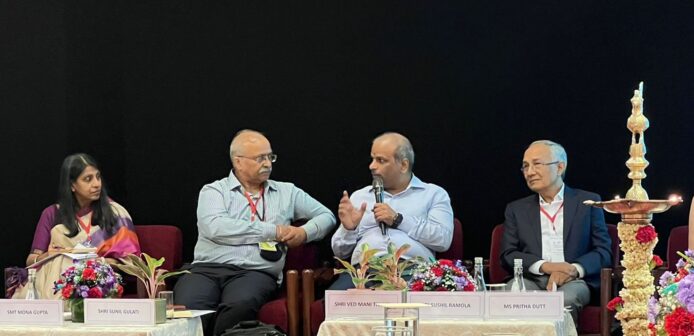Domestic Workers Sector Skill Council (DWSSC) held its first industry stakeholder meeting on 29th July 2022 in New Delhi. The industry stakeholders in the meeting discussed the current challenge of bridging the skill gap in the domestic work and caregiving segment, the scope of employability and understanding of the international market and mobility, among others.
The eminent panellists for the meet were K Ganesh, Serial Entrepreneur and Promoter – Big Basket, Portea Medical, HomeLane, BlueStone and Director, DWSSC; Mr Sunil Gulati, IAS (Retd), Ex-Chief Resident Commissioner, Haryana; Ms Pritha Dutt, Director, Empower Foundation and Ms Gitali Thakur, Founder, MyHelp. The meeting was moderated by Mr Sushil Ramola, Co-Founder & Managing Director, B-ABLE & Chairman, DWSSC.
While talking about the need for trained and qualified homecare professionals, Industry Partner and Panellist Mr K Ganesh, Serial Entrepreneur and Promoter – Big Basket, Portea Medical, HomeLane, BlueStone & Director, DWSSC stated “According to the UN, India is dealing with an ageing crisis because for the first time, there are more elderly people than children. The number of factors cited for longevity is rising, including improvements in medical technology and the fact that people are living longer and longer. The idea that home care professionals should be qualified, trained, and ambitious in general, and elder care workers in particular, falls under that.

There are 130 million elders in India today, and they are rising at a rate of 3% per year quicker than any other group. By 2050, 20% of our population is predicted to be elderly, making India one of the oldest countries in the world by 2025. Additionally, I’d want to add that this presents an opportunity similar to how the global IT services industry dominated employment opportunities for Indians. We have the demographic, the population, and the number of individuals who need some language training, so we can establish ourselves as the centre from which the world can receive elder care support and caregiving assistance. But with the use of technology, we will be able to maintain this not just in India but also internationally, creating jobs”.
Adding to this, Mr Sunil Gulati, IAS (Retd), Ex-Chief Resident Commissioner said, “There is a significant need to train everyone who also works for the government and demonstrate to them the opportunity for learning and skill development in this field”.
Mr Sushil Ramola, Co-Founder & Managing Director, B-ABLE & Chairman, DWSSC highlighted that there is a distinct transition pathway from local to regional to national to international for this sector.
Ms Pritha Dutt, Director, Empower Foundation mentioned that this sector could be made aspirational by incorporating technology and techniques.
The meeting addressed the stages for migration, policy intervention, creating jobs, requiring inputs and reaching a consensus on views on skill gaps in the current skilling environment and wherever we foresee the skill shortages in the following five years.
Ms Mona Gupta, Chief Executive Officer, DWSSC said, “As we are leapfrogging into a new era of education and skills, this meet is being held to get our Industry Stakeholders and Partners on the same page with regard to employability and entrepreneurship, as well as to build demand-based skills for jobs. Since the skill ecosystem is at the right landmark where we are required to have transforming standards and to be able to create sustainable livelihoods, which is one of the Domestic Workers Sector Skill Council (DWSSC)’s missions.
Emphasising the much-need formalisation of domestic workers, Chief Guest Shri Ved Mani Tiwari, COO and Officiating CEO, NSDC, said “There is a demand in this industry and we have to figure out how to formalize this sector. Our guiding principle should be to seize all opportunities for the formalisation of domestic workers that come our way. There were only a few thousand workers registered at the e-SHRAM portal, and they were unsure of what would follow there.
There are two advantages to formalising domestic workers: the government is providing two years of insurance, and e-SHRAM is providing the Universal Access Number, the nodal identification for social security benefits will be this UAN number, and all social security numbers will be targeted by the UAN number. This will be the first step in formalising.”
While suggesting how to make the segment on upskilling and reskilling more welcoming to domestic workers and caregivers, Mr Ved Mani Tiwari, said that “All workers have a basic understanding of their jobs, and since many of them have smartphones, YouTube can be thought of as one of the opportunities to teach them soft skills. In addition, we have launched a channel on Jio TV for employability skills by NSDC, which focuses on soft skills and also includes content which could help in teaching domestic workers in this sector.”
To make this sector aspirational, the chain of trust needs to be built in order to sensitize the household & establishments alongside inputting the potential workforce. The dignity of labour and taking pride in one’s work is a fundamental life skill, that is on the agenda of this sector meeting, considering that this industry needs to emerge and have a globally aspirational stature.
At the end of the event, Mr Sushil Ramola, Co-Founder & Managing Director, B-ABLE & Chairman, DWSSC and Ms Mona Gupta, Chief Executive Officer, DWSSC thanked all the guests, panellists, industry partners and stakeholders and participants who attended the meeting for their active participation in the program.














I would like to be the part of such activities since we already are working on this issue